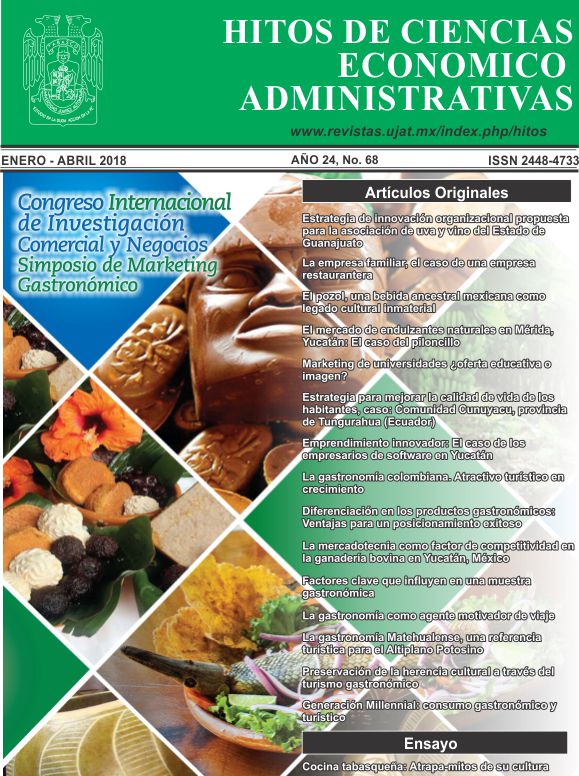EL POZOL, UNA BEBIDA ANCESTRAL MEXICANA COMO LEGADO CULTURAL INMATERIAL
DOI:
https://doi.org/10.19136/hitos.a24n68.3234Keywords:
Bien inmaterial. Pozol. Microempresas familiares. Cultura.Abstract
OBJETIVO: Describir la elaboración del pozol como un bien inmaterial gastronómico, colocando énfasis en la transmisión de las prácticas culturales como elemento que permite la vigencia de la cocina ancestral tabasqueña. MATERIAL Y MÉTODO: El estudio se refiere a la elaboración artesanal del pozol, donde influyen aspectos como el tipo de materia prima, tiempo de cocción, proceso de tostado del cacao, tipo de maíz entre otros. Se utilizó como técnica, la entrevista libre estructurada a partir un cuestionamiento detonador para conocer la manera en que se transmite el conocimiento de su elaboración y la relación con la familia. El tipo de muestreo fue no probabilístico por conveniencia, porque se entrevistó a personas oriundas de tres municipios tabasqueños representativos de la región de los Ríos, la Sierra y Centro, para conocer si en estas regiones prevalece la trasmisión de las tradiciones culturales con respecto a la elaboración esta bebida. RESULTADOS: La población entrevistada coincidió en el proceso general de elaboración del pozol. Las combinaciones del maíz con cacao, canela, cacahuate, pataste y camote resultan típicas en la región, contribuyendo a la nutrición de las familias por su contenido calórico de carbohidratos y grasas. La comercialización de esta bebida se hace en microempresas familiares en mercados, pequeños locales comerciales y en las casas, caracterizándose por ser rentable al proveer ingresos para el distribuidor sobre el 50% de la inversión. CONCLUSIONES: El pozol es una bebida ancestral, un legado cultural de los mayas-chontales y una oportunidad de negocios para las familias. Su valor nutricional, su representatividad como la bebida tradicional del Estado de Tabasco y su flexibilidad de combinación con diversos frutos y semillas lo hacen altamente comercializable como agua fresca y masa-base para elaboración de la bebida, creando ingreso y permitiendo el desarrollo social y comercial de la región.Downloads
Downloads
Published
Issue
Section
License
As a requirement for the manuscript, the author is requested to provide the Copyright Assignment Letter, so that the Journal has the publication rights and to avoid plagiarism.
PLAGIARISM POLICIES
The Editorial Board of the Journal HITOS DE CIENCIAS ECONÓMICO ADMINISTRAIVAS has the authority to reject in the review process any manuscript that does not have adequate citation in the documents consulted in its scientific research work, which can be considered as plagiarism behaviors. Likewise, the referees carry out the plagiarism review using specialized software, such as iThenticate, among others.
COPYRIGHT POLICIES
Authors who have publications in the journal accept the following terms: • At the time the manuscript is accepted, the author transfers the copyright to the Journal HITOS DE CIENCIAS ECONÓMICO ADMINISTRATIVAS.
- The authors may make additional agreements for non-exclusive distribution of the published version of the article (e.g., including it in an institutional repository or publishing it in a book) provided that the initial publication in this journal is indicated.
- Authors are allowed and recommended to publish their research work on the Internet (eg, institutional or personal files), which would allow more beneficial exchanges to increase the citation of the published work.
This work is licensed under Creative Commons Attribution-NonCommercial-NoDerivatives 4.0 International

